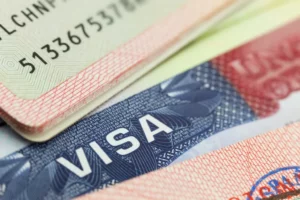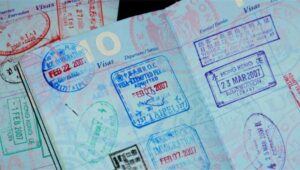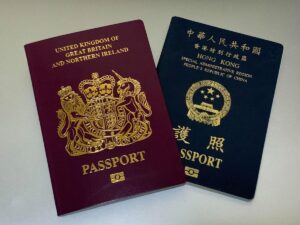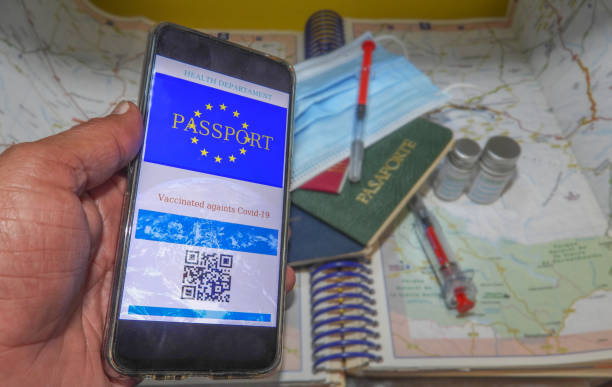Immigration
Humanitarian Visa Process: A Step-by-Step Guide
Are you looking for information about the Humanitarian Visa Process? If so, you’ve come to the right place! This comprehensive guide for eligible applicants is designed to provide you with the necessary information to understand the Humanitarian Visa Process, including the requirements, the application process, and the potential benefits.
Whether you plan to apply for a Humanitarian Visa yourself or are just interested in learning more, this guide has everything you need to know. So, let’s dive right in and take a look at the Humanitarian Visa Process.
What is Humanitarian Visa?

The Humanitarian Visa is a type of visa that allows individuals to come to the United States for humanitarian purposes, such as providing aid or protection in a conflict zone.
The Humanitarian Visa Process is a lengthy one, as it involves filing a petition, gathering supporting documentation, and undergoing a review process. The U.S. Department of Homeland Security must approve all Humanitarian Visa applications on a case-by-case basis.
To prepare for the process, applicants should consult with an immigration lawyer to ensure that all the necessary documentation is in order and the application is complete.
This guide provides a comprehensive overview of the Humanitarian Visa Process. It explains the requirements for obtaining a Humanitarian Visa, outlines the steps involved, and offers helpful tips on how to prepare for the review process. With the right preparation, applicants can give themselves the best chance of success in obtaining a Humanitarian Visa and making their way to the United States.
Eligibility
To qualify for a humanitarian visa, applicants must first meet the criteria for one of the categories of humanitarian visa applicants listed in the Immigration and Nationality Act (INA). This includes refugees, asylum seekers, and stateless persons.
Applicants must then go through a background check to ensure that they do not pose a security risk to the United States.
Additionally, applicants must provide evidence of their humanitarian need for the visa and demonstrate that they have a well-founded fear of persecution in their home country due to their race, religion, nationality, political opinion, or membership in a particular social group.
Applicants must also demonstrate that they are in a situation of unusually severe hardship in their home country and have not been firmly resettled in another country. Finally, applicants must be admitted to the United States under the INA.
READ ALSO: Your Ultimate Guide to Spouse Visa: Requirements, Process, and Tips
What Forms and Documents Do I Need to Submit?

The process of obtaining a humanitarian visa can seem daunting, but with the right resources and guidance, it can be made straightforward. The first step is to understand the requirements and gather all the necessary documents to apply.
Form DS-117 is the official application form for a humanitarian visa. This form must be completed and submitted with the other necessary documents. Evidence of eligibility must also be provided, such as a birth certificate or proof of citizenship. Travel documents such as a passport or other valid travel documents must also be submitted with the application.
Financial documents, such as pay stubs, bank statements, and tax returns, must be provided to prove sufficient financial resources. Additionally, supporting documents such as police reports, medical records, and letters of recommendation must also be included to support the application.
In some cases, the applicant may be required to attend an interview with a US Consulate or Embassy. A fee must also be paid to cover the cost of the application process.
Examples of Urgent Humanitarian Visa Reasons
In times of natural disasters, refugee resettlement, medical emergencies, humanitarian aid, crises, and emergencies, individuals may be eligible for an urgent humanitarian visa. For those affected by natural disasters, such as earthquakes, floods, and hurricanes, an urgent humanitarian visa may be available.
Refugees fleeing conflict or persecution can also be eligible for an urgent humanitarian visa. Additionally, individuals requiring urgent medical treatment in the United States may be eligible. Those providing humanitarian aid in an emergency may also be eligible for an urgent humanitarian visa.
Those affected by a humanitarian crisis, such as a famine or a pandemic, may also be eligible. Finally, those affected by a humanitarian emergency, such as a civil war or a large-scale displacement of people, may also be eligible.
Who is Not Eligible for Parole to the United States?

Humanitarian visa processes are designed to provide individuals with the opportunity to enter the United States, either temporarily or permanently, when they meet certain eligibility criteria.
However, certain individuals are ineligible for humanitarian visas, including those who have been convicted of aggravated felonies, are considered a threat to national security or public safety, have a history of drug trafficking or criminal activity, have been previously removed from the United States, have been determined to be inadmissible to the United States, have been deemed ineligible for a waiver of inadmissibility, or have a history of human rights violations or terrorism-related activities.
Individuals need to understand the eligibility criteria for humanitarian visas and the potential consequences of failing to meet these criteria. Individuals who are deemed ineligible for humanitarian visas may be subject to detention, deportation, or other legal action.
Therefore, applicants must understand the requirements and take steps to ensure they meet them before submitting their application.
Applicants should be aware that the U.S. Department of Homeland Security (DHS) may consider other factors in addition to the above-mentioned criteria when determining an individual’s eligibility. This includes considering the applicant’s criminal history, immigration history, and other relevant factors.
How Long Does It Take to Get a Humanitarian Visa?
The process of obtaining a Humanitarian Visa can be a lengthy one. Depending on the type of visa, the individual circumstances of the applicant, and the amount of processing time required by the relevant government agency, applicants should expect the entire process to take anywhere from six to nine months.
During this time, applicants must submit all the necessary documents, undergo a medical examination, and attend an in-person interview with a consular officer.
How Long Does a Humanitarian Visa Last?

Humanitarian Visas are a great way for eligible applicants to gain entry into a country for a limited period. Typically, a Humanitarian Visa lasts for a period of up to three years. However, the exact length of the visa will depend on the individual’s particular circumstances.
Humanitarian Visa holders may be eligible for an extension of their visa, depending on their circumstances. The maximum length of stay for a Humanitarian Visa is five years. After five years, visa holders may be required to apply for a visa of a different type.
READ ALSO: Apply for a Canadian Tourist Visa: Your Complete Guide
How Do I Apply for Humanitarian Visa?
Are you looking to come to the United States on a humanitarian visa? If so, we’ve got you covered. This comprehensive guide will walk you through the entire process, from determining your eligibility to making arrangements to travel to the US.
First, you need to determine if you are eligible for a Humanitarian Visa. This process will involve looking at the type of visa you need, how long you plan to stay, and other factors. Once you’ve determined your eligibility, you can start gathering the necessary documents, such as a valid passport, birth certificate, and proof of financial resources, to complete the application.
After that, you’ll need to complete the necessary application forms and submit them to the appropriate embassy or consulate. You will also need to pay the required fee and submit your application. Once that’s done, you’ll need to wait for your visa to be issued.
Once your visa is issued, you can start making arrangements to travel to the US. Be sure to present your visa and any other documents required at the port of entry into the US. You may also be asked questions by US immigration officials, so be prepared to answer them.
Finally, once you’re in the US, make sure to follow all the rules and regulations of your stay. This will ensure that your visa remains valid and you can enjoy your stay in the US without any complications.
What Can I Do If My Petition Is Denied?

Before beginning the process, it is important to understand all of the requirements and the potential outcomes. If your petition is denied for any reason, it is important to review the decision carefully and determine if there are any steps you can take to rectify the issue.
You may also be able to appeal the decision and present new evidence to support your case. If you think that the decision was incorrect, you can also file a new petition.
For those who are unable to resolve the issue on their own, it may be necessary to seek legal advice from an immigration lawyer. Additionally, it is important to stay in touch with the US consulate and request additional information if you have any questions or concerns about the process.
By following these tips, you can increase your chances of completing the humanitarian visa process. Good luck!
Conclusion
Overall, it is essential for those interested in applying for a humanitarian visa to do their due diligence and research to ensure that they meet the requirements and restrictions.
Furthermore, it is beneficial to seek help from a professional who can provide advice and guidance throughout the process. With the right preparation, applicants can increase their chances of obtaining a humanitarian visa.






